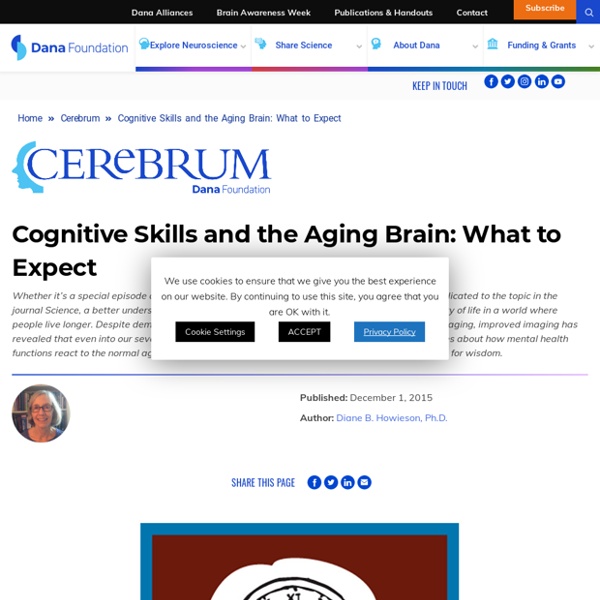Aging & Cognitive Function
How does aging affect memory and cognition (thinking)? Almost all of us become aware of changes in memory and cognition (thinking) as we get older. We begin to have difficulty recalling names of people and places, notice that our mental processing has slowed, and that learning is more difficult. We find that certain functions (for example, eye-hand coordination) are also slower. Cleveland Clinic is a non-profit academic medical center. Advertising on our site helps support our mission.
How memory and thinking ability change with age
Scientists used to think that brain connections developed at a rapid pace in the first few years of life, until you reached your mental peak in your early 20s. Your cognitive abilities would level off at around middle age, and then start to gradually decline. We now know this is not true.
What is Normal Cognitive Aging?
iStock.com/PeopleImages Everyone experiences a “senior moment” as they get older. Episodes of misplacing keys or forgetting an acquaintance’s last name doesn’t necessarily signal a brain disease. We asked Denise Park, director of research at the Center for Vital Longevity and chair in Behavioral and Brain Sciences at the University of Texas at Dallas, what happens to the brain and cognition as we simply get older and what we can do to mitigate the effects of it.
Eight Habits That Improve Cognitive Function
The New York Times recently published an article about the "brain fitness" business, "Do Brain Workouts Work? Science Isn’t Sure." I believe the answer is no. Without a variety of other daily habits, these "brain-training" games cannot stave off mental decline or dramatically improve cognitive function.
Age-associated cognitive decline
We use cookies to enhance your experience on our website.By continuing to use our website, you are agreeing to our use of cookies. You can change your cookie settings at any time. <a href=" Find out more</a> Skip to Main Content Search Close
Memory loss: 7 tips to improve your memory
Memory loss: 7 tips to improve your memory Try these simple ways to improve your memory. By Mayo Clinic Staff
Exercise Helps Older People Stay Sharp and Remember More
Exercise has so many health benefits: it can help prevent osteoporosis, lower cholesterol, reduce the pain of fibromyalgia, ease the symptoms of menopause, and reduce your risk of developing breast cancer, colon cancer, and prostate cancer. But did you know that physical activity is also a fountain of youth for our brains? Some research suggests that, just by being active, seniors can improve their ability to think, focus, plan, and recall words, as well as perform many other brain activities. These brain activities (also called cognitive function)[1] include: LanguageThoughtMemoryExecutive function (the ability to plan and carry out tasks)JudgmentAttentionPerceptionRemembered skillsAbility to have a purposeful life
Hippocampal and Cerebral Blood Flow after Exercise Cessation in Master Athletes
Introduction Endurance exercise training (exercise) produces physiological adaptations that enhance aerobic fitness and cardiovascular health (Brooks et al., 1996). Consistent exercise effectively augments the maximal rate of oxygen consumption (O2max) centrally, by increasing cardiac output, and/or peripherally by widening the arterial-venous oxygen (A-O2) difference (Seals et al., 1981). O2max is the gold-standard index of cardiorespiratory fitness and is highly correlated with both morbidity and mortality (Hoekstra et al., 2008; Sawada et al., 2012), with greater fitness status associated with a reduced risk of chronic disease and a longer lifespan. In addition to enhancing the function of the cardiovascular system, exercise has been shown to increase bone density, improve muscle quality, and protect against metabolic dysfunction (Brooks et al., 1996).
Senior Exercise and Fitness Tips
No matter your age, it’s never too late to get fit. These easy tips will help you get started safely and make it fun. What are the benefits of exercise for older adults? There are many reasons why we tend to slow down and become more sedentary with age.



